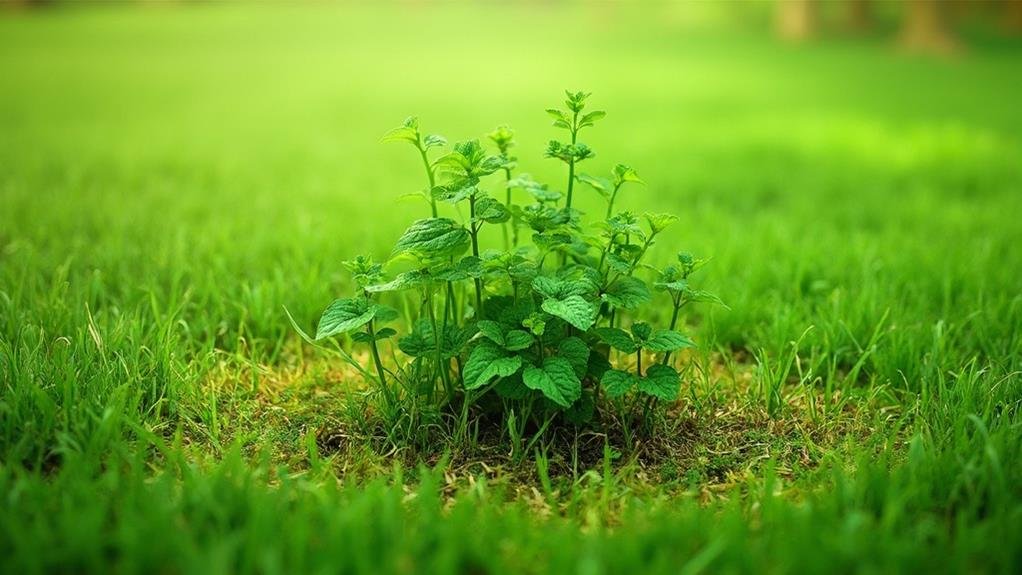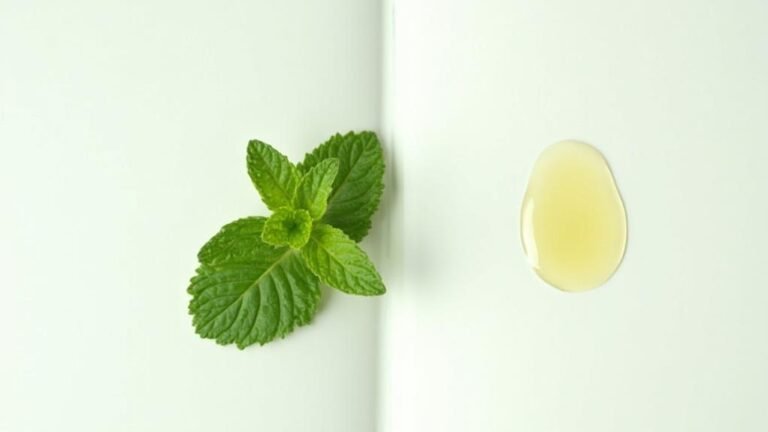Does Peppermint Oil Kill Grass?
Yes, peppermint oil can kill grass, especially when used in concentrated forms or in excess.
This is because peppermint oil contains compounds that can disrupt the plant’s natural processes, such as photosynthesis and nutrient absorption.
While often touted for its pest-repelling properties, gardeners should be aware of its potential herbicidal effects. To ensure safety while using essential oils around pets, refer to essential oils critical for dogs.
Why Peppermint Oil Can Kill Grass
Peppermint oil is a complex mixture of various compounds, and some of these have herbicidal properties.
Menthone, for example, is a key component that contributes to the oil’s ability to damage and kill grass. These compounds work in a couple of ways:
- Disrupting Photosynthesis: Peppermint oil can interfere with the process by which plants convert sunlight into energy, leading to stunted growth, yellowing, and eventually death of the plant.
- Affecting Nutrient Absorption: It can alter the permeability of cell membranes in the plant, hindering its ability to take up essential nutrients and water from the soil, further contributing to its demise.
The concentration of peppermint oil is a critical factor in determining its effect on grass.
Low concentrations may not cause significant damage, but concentrations above 5% can have a strong herbicidal effect.
It’s also worth noting that other essential oils, like cinnamon and vinegar, can also harm grass when used improperly.
How Peppermint Oil Affects Grass

The impact of peppermint oil on grass isn’t always straightforward. Several factors influence how it will affect your lawn:
- Concentration: As mentioned, higher concentrations increase the risk of damage and are more likely to kill grass.
- Grass Type: Different types of grass exhibit varying levels of sensitivity to peppermint oil. Cool-season grasses, such as Kentucky bluegrass and perennial ryegrass, are generally more susceptible to damage compared to warm-season grasses like Bermudagrass and Zoysiagrass.
- Application Method: The way you apply the oil matters. Direct application of concentrated oil is more likely to cause harm than a diluted spray.
- Environmental Conditions: Temperature, humidity, sunlight exposure, soil type, and soil moisture can all influence the oil’s effectiveness and its potential to damage your lawn.
How to Use Peppermint Oil Safely Around Grass
If you’re using peppermint oil in your garden for pest control or other purposes, it’s crucial to take precautions to protect your lawn:
- Dilute the Oil: Always dilute peppermint oil with water or a carrier oil before applying it near grass. A general rule of thumb is to use 5-10 drops of essential oil per ounce of carrier. This helps to reduce its potency and prevent it from harming your grass.
- Use a Carrier Oil: Carrier oils like coconut or almond oil can help to further dilute the essential oil and ensure even application on the grass. They also act as a buffer, minimizing the risk of direct damage to the plant. Additionally, carrier oils can offer benefits like moisturizing the plant and improving soil health. For more on carrier oils, check out our guide on mineral oil as a carrier oil.
- Apply in the Evening: Applying peppermint oil to your lawn in the evening, when the sun is less intense, allows for better absorption and reduces the risk of the oil evaporating before it can be effective.
Alternatives to Peppermint Oil for Grass Control

If your goal is to control grass growth in specific areas, consider these alternatives to peppermint oil:
- Vinegar-based herbicides: These are a popular choice because they are biodegradable and non-toxic. However, their effectiveness can vary depending on the type of grass and the concentration of the vinegar.
- Boiling water: This is a simple and inexpensive method that can effectively kill grass. However, be cautious when using this method as it can also harm nearby plants.
- Solarization: This technique involves covering the area with clear plastic to trap heat from the sun, effectively killing the grass and weed seeds. It’s an environmentally friendly option but requires time and careful planning.
Safety Precautions When Using Peppermint Oil
When handling and applying peppermint oil, remember these safety precautions:
- Follow label instructions: Always read and follow the instructions on the essential oil bottle.
- Avoid skin contact: Peppermint oil can cause skin irritation in some individuals. Wear gloves when handling it.
- Wear protective gear: If you’re working with concentrated peppermint oil, consider wearing a mask to avoid inhaling the fumes.
- Keep away from children and pets: Store essential oils out of reach of children and pets to prevent accidental ingestion or exposure.
Environmental Factors Affecting Peppermint Oil’s Efficacy
The effectiveness of peppermint oil in your garden can be influenced by various environmental factors:
- Temperature: Higher temperatures can increase the oil’s phytotoxic effects, making it more potent.
- Humidity: Humidity levels can affect how quickly the oil is absorbed and how fast it evaporates.
- Sunlight exposure: Intense sunlight can reduce the effectiveness of peppermint oil.
- Soil type: Well-draining soils with low organic matter tend to increase the oil’s efficacy.
- Soil moisture: Adequate soil moisture is essential for the oil to move through the soil and reach the roots of the grass.
By considering these factors and adjusting your application timing and methods accordingly, you can optimize the use of peppermint oil in your garden.
Alternatives to Essential Oils for Pest Control
If your primary reason for using peppermint oil is pest control, there are other natural alternatives you can consider:
- Neem Oil: This is a botanical pesticide derived from the seeds of the neem tree. It acts as a natural repellent and disrupts the life cycle of many common garden pests.
- Garlic Oil: Garlic oil is known for its insecticidal and fungicidal properties, making it an effective deterrent against a wide range of pests.
- Cayenne Pepper: The spicy nature of cayenne pepper makes it a natural deterrent for many pests. You can sprinkle it around plants or create a spray with water.
Conclusion
Peppermint oil can be a helpful tool for gardeners, but it’s important to be aware of its potential effects on grass.
By understanding the factors that influence its efficacy and taking the necessary precautions, you can minimize the risk of damage to your lawn.
If you’re looking for alternatives for grass control or pest control, several effective and environmentally friendly options are available.
Remember to always prioritize the health of your lawn and the safety of yourself, your family, and your pets when using any gardening products, including essential oils.







